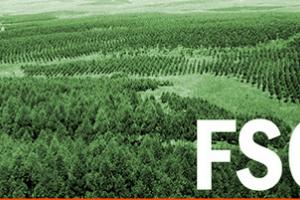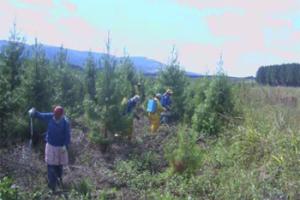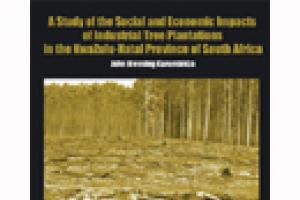Press Release - September 1, 2006
South Africa
1 September 2006
Other information
2 July 2006
In South Africa, a thorough research carried out by John Blessing Karumbidza --“A Study of the Social and Economic Impacts of Industrial Tree Plantations in the KwaZulu-Natal Province of South Africa”, available at http://www.wrm.org.uy/countries/SouthAfrica/book.pdf -- has identified a host of damaging economic, social and environmental impacts of monoculture tree plantations affecting local communities, water resources and ecosystems.
Bulletin articles
7 April 2006
As part of a two-year process to review FSC policy on the certification of timber plantations, members of the policy review working-group (PWG) recently visited South Africa for their final meeting. What follows are some quotes from the report on the field trip to visit plantation areas, produced by Wally Menne (member of the local Timberwatch Coalition).
Other information
5 April 2006
Only in available in Spanish -
Por Javier Baltodano - Grupo de Trabajo en la Revisión de las Políticas de Certificación a Grandes Plantaciones FSC .
Introducción:
Bulletin articles
8 February 2006
Although miles and miles of pine monoculture can be visually appealing to those of us with a more northern hemisphere way of looking at things, they can also be seriously bad news environmentally. Exotic tree plantations have earned the name ‘green death’ from eco-activists, who point out that they displace native species, very few of which can live in plantations.
Plantations in the eastern parts of South Africa are particularly notorious for consuming grassland, now considered our most threatened biome due to 60% (ACTUALLY 80%) of its area being lost.
Publications
25 December 2005
By John Blessing Karumbidza
Other information
9 December 2005
"Rural people are very knowledgeable, but they don't have degrees. Neither do they speak the 'right' language. This study helps me to empower the community. I see myself as a voice of the voiceless, committed to the struggle for the advancement of the dignity of our people," John Blessing Karumbidza said, opening his presentation in Vitória. Born in rural Zimbabwe, Karumbidza is a Junior Lecturer in Economic History at the University of KwaZulu-Natal in Durban.
Bulletin articles
12 November 2005
South African pulp and paper company Sappi is planning to increase the capacity of its Sappi Saiccor mill by more than 200,000 tons a year. Sappi Saiccor is the largest producer of chemical cellulose (dissolvable pulp) in the world. Its mill at Umkomaas, about 50 kilometres south of Durban Port currently produces about 600,000 tons of chemical cellulose a year. The chemical cellulose is used to produce things like cigarette filters, sweet wrappers, an additive to washing powder that stops dirt sticking to clothes and the stuff that makes vitamin tablets stick together.
Bulletin articles
12 October 2005
Like other countries invaded by monoculture tree plantations (or the “green cancer”, as some South Africans call them), South Africa shows that those schemes have not been aimed at ameliorating local peoples’ quality of life. On the contrary.
Adding to the information delivered by the report on the impacts of outsourcing on forestry (see WRM Bulletin Nº 96), shocking statistics came out of the first forestry sector empowerment charter workshop held in East London on September 12.
Bulletin articles
14 July 2005
A recent study carried out in the South African tree plantation sector analyses the impacts of outsourcing on forestry --mostly women-- workers. The report points out that outsourcing in the forestry industry is in line with global business trends and serves to increase flexible employment terms for the benefit of the industry. Outsourcing also saves on cost of capital equipment and fixed costs associated with full-time employees, and avoids having to deal with labour legislation brought in by the Government.
Bulletin articles
20 May 2005
Large scale monoculture tree plantations have been imposed globally, erasing other ecosystems, changing water patterns, eroding the soil, creating poverty. Within a project of the South African NGO Geasphere to examine such impacts on rural people’s livelihoods and culture in the Province of Mpumalanga, Godfrey Silaule conveys a vivid picture of how people from the Graskop community suffer such distortion:
Bulletin articles
21 March 2005
A meeting of the Mpumalanga Civil Society was held on 5 March, 2005, in a barn at Tim Brewer's trout farm, Katrinasrus , near Machadodorp . This somewhat out-of-the-way venue provided most of the participants with an opportunity to explore roads less travelled . About 50 people attended, some from as far afield as Gauteng and KwaZulu Natal.



